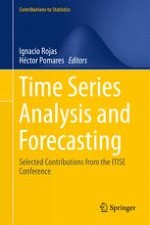2016 | OriginalPaper | Chapter
Predictive and Descriptive Qualities of Different Classes of Models for Parallel Economic Development of Selected EU-Countries
Authors : Jozef Komorník, Magdaléna Komorníková
Published in: Time Series Analysis and Forecasting
Publisher: Springer International Publishing
Activate our intelligent search to find suitable subject content or patents.
Select sections of text to find matching patents with Artificial Intelligence. powered by
Select sections of text to find additional relevant content using AI-assisted search. powered by
